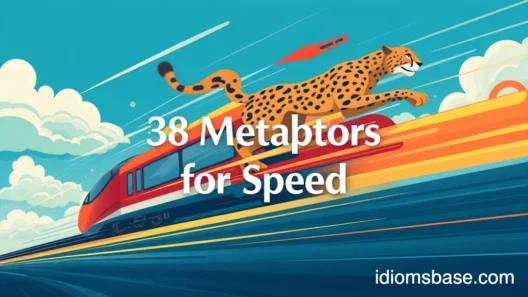Feeling overwhelmed? Like you're constantly juggling too many balls in the air, or perhaps stuck in a never-ending race? Stress, that familiar companion, often feels impossible to describe with just one word. But what if we told you there are countless ways to paint a picture of it? Metaphors, those vivid linguistic tools, can help us understand and articulate the many faces of stress, not just for ourselves but for others too.
We all experience stress differently. For some, it’s a dull ache; for others, a roaring fire. Using metaphors can help you pinpoint exactly what you’re feeling. This understanding is the first step toward managing it. So, let’s dive into 38 powerful metaphors that capture the essence of stress, helping you find the perfect words to describe your experience!
The Weight of Stress: Heavy Burdens and Crushing Loads
Stress often feels like a physical weight pressing down on us. These metaphors highlight the oppressive nature of feeling overwhelmed.
- A heavy blanket: Imagine a thick, suffocating blanket that makes it hard to breathe or move. This metaphor captures the feeling of stress weighing you down, making everything feel sluggish and difficult.
- A ton of bricks: When something hits you hard and unexpectedly, it can feel like a sudden, crushing weight. Stress, especially acute stress, can feel this way.
- A backpack full of rocks: Each worry, each task, each responsibility adds another rock to your bag. Over time, that bag gets incredibly heavy, making every step a struggle.
- A lead cape: This isn't just heavy; it's restrictive. A lead cape makes you feel slow, cumbersome, and unable to move freely, much like how stress can limit your actions and thoughts.
- A vise grip: Picture something clamped tightly around your head or chest, squeezing relentlessly. This metaphor powerfully conveys the physical tension and pressure stress can create.
- A crushing wave: Sometimes stress isn't constant but comes in overwhelming surges. A massive wave can knock you off your feet, leaving you gasping for air.
- A mountain on your shoulders: This evokes a sense of immense, unmanageable responsibility. It’s the feeling that you’re carrying an impossible load all by yourself.
The Pressure Cooker: Intense Heat and Building Pressure
Stress can make you feel like you're constantly under immense pressure, building up to an explosive point.
- A ticking time bomb: This metaphor perfectly captures the anxiety of a deadline or an impending crisis. The clock is ticking, and you feel the pressure building, knowing something might explode.
- A pressure cooker: Inside a pressure cooker, everything gets hot and intense. This describes a situation where stress is constantly building, making you feel like you might burst.
- A stretched rubber band: You can only stretch a rubber band so far before it snaps. This illustrates the feeling of being pulled in too many directions, nearing your breaking point.
- A boiling kettle: The water inside a kettle gets hotter and hotter until it whistles loudly. This is how stress can feel when it builds up, leading to a visible outburst or breakdown.
- A tightrope walk: Every step is precarious, and one wrong move could send you plummeting. This metaphor highlights the anxiety and extreme focus required when under high stress, where failure feels imminent.
- A race against the clock: When you're constantly rushing, trying to beat deadlines, or feeling like there's never enough time. This is the essence of time-related stress.
The Entanglement: Trapped, Tangled, and Stuck
Sometimes stress feels like you’re caught in something, unable to escape or find your way out.
- A tangled knot: Your thoughts, your to-do list, your emotions – all tied up in a messy, impossible-to-unravel knot. This metaphor describes mental confusion and feeling overwhelmed by complexity.
- A spiderweb: You feel caught, struggling against invisible threads that only seem to tighten the more you fight. It's about feeling trapped and helpless.
- Quicksand: The more you struggle, the deeper you sink. This metaphor highlights the feeling of being overwhelmed and the fear that your efforts are only making things worse.
- A maze with no exit: You keep trying different paths, but they all lead to dead ends. This describes the frustration and despair of feeling trapped in a stressful situation with no clear way out.
- A hamster wheel: Running and running, expending a lot of energy, but getting nowhere. This perfectly illustrates the feeling of being busy but unproductive, stuck in a repetitive, stressful cycle.
- A tangled ball of yarn: Similar to a knot, but perhaps more chaotic and sprawling. It’s about feeling your life or thoughts are a messy jumble.
The Invasion: Stress as an Unwanted Presence
Stress can feel like an external force that invades your space, your mind, or your peace.
- A dark cloud: This implies a looming presence, casting a shadow over everything. It suggests a pervasive, gloomy feeling that dampens your mood and outlook.
- A shadow: Always there, following you, no matter where you go. Stress can feel like an inescapable presence that never truly leaves your side.
- A buzzing fly: Annoying, persistent, and incredibly distracting. This metaphor captures the irritating and relentless nature of minor, ongoing stressors.
- A leaky faucet: A constant drip, drip, drip. Not a flood, but a persistent, irritating annoyance that slowly wears you down. This is for chronic, low-level stress.
- A storm brewing: You can feel it coming, the tension in the air before a big storm hits. This describes anticipatory stress, the anxiety before a major event.
- A thief in the night: Stress can steal your peace, your sleep, and your joy, often subtly and without you realizing it until it’s too late.

The Battleground: Stress as a Conflict
Sometimes, stress feels like a constant fight, an internal or external struggle.
- A constant battle: You're always fighting something, whether it's deadlines, difficult people, or your own anxious thoughts. It’s an ongoing struggle.
- A tug-of-war: You feel pulled in opposing directions, torn between different demands or desires. This metaphor highlights the internal conflict stress can create.
- A roaring fire: Stress can feel destructive, consuming everything in its path. It can burn you out, leaving you feeling empty and exhausted.
- A runaway train: Out of control, speeding forward, and you can't stop it. This depicts a feeling of being overwhelmed by circumstances that are spiraling.
- A sharp knife: Stress can feel cutting, painful, and piercing, especially when it comes from harsh words or sudden shocks.
- A dam about to burst: The pressure is building, and you're holding back a flood of emotions or responsibilities, but you know you can't hold on forever.
The Erosion: Stress as a Slow Wearing Away
Stress isn't always dramatic; sometimes, it's a slow process that wears you down over time.
- A slow leak: Like a tire slowly deflating, stress can drain your energy and resilience over time without a sudden dramatic event.
- Rust: Slowly but surely, rust eats away at metal, weakening it. Chronic stress can erode your well-being, health, and happiness over time.
- A dripping tap: Similar to a leaky faucet, but emphasizing the relentless, monotonous nature of chronic, low-level stress that eventually drives you crazy.
- Sand through your fingers: No matter how tightly you grasp, it slips away. This can describe the feeling of losing control or having your energy deplete despite your efforts.
- A heavy fog: It obscures your vision, makes things unclear, and slows you down. Stress can make it hard to think clearly or see a way forward.
- A splinter: Small, annoying, and persistent. It might not be debilitating, but it's always there, causing discomfort until it’s removed.
- A thorny bush: Every step you take, you get pricked. This describes a situation where every aspect seems to cause pain or difficulty.
Key Takeaways

- Metaphors help us understand stress: They provide vivid imagery that can make abstract feelings more tangible and easier to process.
- Stress manifests differently: There's no one-size-fits-all description for stress. These metaphors highlight its diverse impacts, from feeling heavy to feeling trapped.
- Expressing stress can be empowering: Finding the right words helps you communicate your experience to others and gain insight into your own feelings.
- Understanding is the first step to managing: When you can clearly articulate what stress feels like, you’re better equipped to find strategies to cope with it.
Frequently Asked Questions (FAQs)
Q1: Why are metaphors useful for describing stress?
Metaphors are incredibly useful because they translate abstract feelings into concrete images. Stress, being an internal and often overwhelming experience, can be difficult to put into words. By using metaphors, you can:
- Clarify your feelings: A metaphor helps you pinpoint the specific sensation or impact of stress. For example, saying "stress feels like a heavy blanket" instantly conveys a sense of suffocation and burden.
- Communicate effectively: When you use a metaphor, others can better understand what you're going through, even if they haven't experienced the exact same thing. It builds empathy.
- Gain perspective: Seeing stress as "a runaway train" might help you realize you need to find a way to slow it down, rather than just feeling helpless. It offers a new lens through which to view your situation.
- Reduce isolation: Knowing there are words to describe your struggle can make you feel less alone in your experience.
Q2: Can using metaphors help me cope with stress?
Absolutely! Using metaphors is a powerful coping mechanism in several ways:

- Validation: Naming and describing your stress, even metaphorically, validates your feelings. It acknowledges that what you're experiencing is real and significant.
- Distancing: When you say "stress is a heavy blanket," you create a slight distance between you and the stress. It's something external that's affecting you, not who you are. This can be empowering.
- Problem-solving: Once you've identified stress through a metaphor (e.g., "a tangled knot"), you can start thinking about solutions in that context (e.g., "how do I untangle this knot?"). It moves you from feeling overwhelmed to looking for action.
- Creative expression: For some, expressing stress through metaphor can be a creative outlet, which is a therapeutic process in itself.
Q3: How can I find the right metaphor for my own stress?
Finding the perfect metaphor is a personal journey, but here are some tips:
- Pay attention to physical sensations: Does stress make your chest feel tight (a vise grip)? Do your shoulders ache (a mountain on your shoulders)?
- Consider its impact on your thoughts: Does it make your mind race (a runaway train) or feel clouded (a heavy fog)?
- Think about its duration and intensity: Is it a constant drip (a leaky faucet) or a sudden, overwhelming force (a crushing wave)?
- Reflect on your emotions: Does it make you feel trapped (quicksand) or like you're fighting a losing battle?
- Try out different metaphors: Read through this list again and see which ones resonate most strongly with you in the moment. It's okay if it changes from day to day!
- Create your own: Don't be afraid to invent a new metaphor if none of these quite fit. Your unique experience might need a unique description.
Q4: Are there any metaphors that are more common or universally understood?
Yes, some metaphors are quite common because they tap into universal human experiences of pressure, weight, or entrapment. For example:
- "A heavy burden" is widely understood to mean a significant load of responsibility or worry.
- "A ticking time bomb" immediately conveys a sense of impending crisis and escalating pressure.
- "A pressure cooker" is a common way to describe an intense, high-stress environment.
- "A tangled mess" (or knot) is often used for confusing and overwhelming situations.
While these are commonly understood, the power lies in finding the metaphor that most accurately reflects your personal experience.
Q5: Can these metaphors also describe positive kinds of stress (eustress)?
While most of the metaphors on this list lean towards the negative, uncomfortable aspects of stress (distress), some could be reinterpreted or slightly adjusted to describe eustress (positive stress). For example:
- "A race against the clock" could be positive if it's a thrilling challenge you're excited to conquer, rather than a dreaded deadline.
- "A tightrope walk" could describe the exhilarating focus and precision needed for a performance or a challenging task, where the stakes are high but the outcome is desired.
- "A boiling kettle" might represent the build-up of excitement and anticipation before a big event, rather than an angry outburst.
However, generally, these metaphors are designed to articulate the unpleasant sensations associated with stress. Eustress often feels more like excitement, challenge, or focus, rather than the crushing weight or suffocating pressure described here.
We hope these metaphors give you a powerful new vocabulary to understand and express your experience with stress. Remember, giving a name to what you feel is the first step toward finding your way through it. Which metaphor resonated most with you today? Share your thoughts and let's keep the conversation going!






